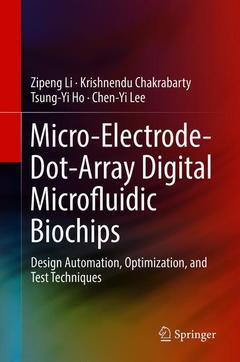Micro-Electrode-Dot-Array Digital Microfluidic Biochips, 1st ed. 2019 Design Automation, Optimization, and Test Techniques
Auteurs : Li Zipeng, Chakrabarty Krishnendu, Ho Tsung-Yi, Lee Chen-Yi

This book provides an insightful guide to the design, testing and optimization of micro-electrode-dot-array (MEDA) digital microfluidic biochips. The authors focus on the characteristics specific for MEDA biochips, e.g., real-time sensing and advanced microfluidic operations like lamination mixing and droplet shape morphing. Readers will be enabled to enhance the automated design and use of MEDA and to develop a set of solutions to facilitate the full exploitation of design complexities that are possible with standard CMOS fabrication techniques. The book provides the first set of design automation and test techniques for MEDA biochips. The methods described in this book have been validated using fabricated MEDA biochips in the laboratory. Readers will benefit from an in-depth look at the MEDA platform and how to combine microfluidics with software, e.g., applying biomolecular protocols to software-controlled and cyberphysical microfluidic biochips.
Introduction.- MEDA Digital Microfluidic Biochips.- Droplet Size-Aware High Level Synthesis.- Efficient and Adaptive Error Recovery.- Structural and Functional Test Methods.- Droplet Size-Aware and Error-Correcting Sample Preparation.- Conclusion.
Zipeng Li received the bachelor’s degree in microelectronics from the Harbin Institute of Technology, Harbin, China, in 2013, and the master’s and Ph.D. degrees in computer engineering from Duke University, Durham, NC, USA, in 2015 and 2017, respectively. Dr. Li is currently a Senior DFT Engineer with Intel Corporation, Santa Clara, CA, USA. His current research interests include design automation for biochips, design-for-test, 2.5-D/3-D ICs, and mixed-technology microsystems.
Krishnendu Chakrabarty received the B. Tech. degree from the Indian Institute of Technology, Kharagpur, in 1990, and the M.S.E. and Ph.D. degrees from the University of Michigan, Ann Arbor, in 1992 and 1995, respectively. He is now the William H. Younger Distinguished Professor and Department Chair of Electrical and Computer Engineering, and Professor of Computer Science, at Duke University.
Prof. Chakrabarty is a recipient of the National Science Foundation CAREER award, the Office of Naval Research Young Investigator Award, the Humboldt Research Award from the Alexander von Humboldt Foundation, Germany, the IEEE Transactions on CAD Donald O. Pederson Best Paper Award (2015), the ACM Transactions on Design Automation of Electronic Systems Best Paper Award (2017), and over a dozen best paper awards at major conferences. He is also a recipient of the IEEE Computer Society Technical Achievement Award (2015), the IEEE Circuits and Systems Society Charles A. Desoer Technical Achievement Award (2017), the Semiconductor Research Corporation Technical Excellence Award (2018), and the Distinguished Alumnus Award from the Indian Institute of Technology, Kharagpur (2014). He is a Hans Fischer Senior Fellow at the Institute for Advanced Study, Technical University of Munich, Germany. He is a 2018 recipient of the Japan Society for the Promotion of Science (JSPS) Fellowship in the “Short Term S: Nobel Prize Level” category.
Presents a method for droplet size-aware high-level synthesis, targeting reservoir placement, operation scheduling, module placement, and routing of droplets of various sizes in a MEDA biochip
Enables efficient and adaptive error recovery, through a probabilistic-timed-automata (PTA)-based strategy for error recovery in MEDA biochips
Includes structural and functional test methods for MEDA biochips
Describes a droplet size-aware sample preparation method, referred to as the weighted sample-preparation method (WSPM), for MEDA biochips
Date de parution : 02-2019
Ouvrage de 144 p.
15.5x23.5 cm



